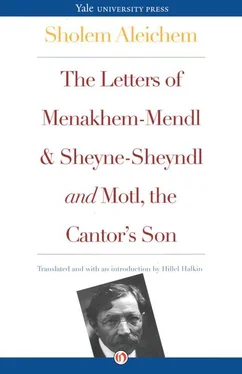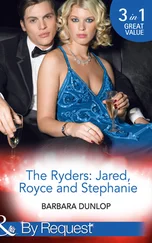Leah’s problem was that she had no one in America to vouch for her. And a husband was available on the Prince Albert. His name was Leyzer Bach and he was a carpenter on his way to an uncle in Chicago. Leyzer was a big, clumsy fellow with blond hair and thick lips, but I liked him because of his songs. He has a beautiful voice. And since he had an uncle to vouch for him, it was decided that he should marry Leah. Need I add that the suggestion came from my friend, the old sea hand?
That’s what they did. When questioned at immigration, Leyzer said he was Leah’s husband and Leah said she was Leyzer’s wife. You would think that would do it, wouldn’t you? But they’re on to such games at Ella’s Island. A husband and wife need a marriage certificate. Leah cried her heart out. “Don’t be silly,” she was told. “You’ll get a divorce in New York and be the same Leah you always were.”
But what if Leyzer didn’t agree to divorce her? And on the other hand, was being sent back any better? In short, the two had a wedding. A sad one, without any music. But it did have a real rabbi and real tears. Lots of them. A whole ocean.
Only one person is satisfied. Would you like to guess who it is? It’s the tailor from Heysen. He’s had his revenge. Now everyone knows he knows best. Each time he walks past us, he strokes his beard and looks at Pinye through his snazzy glasses. But Pinye keeps cool. He sticks his long nose in a book and ignores him. Pinye doesn’t give a damn.
Between our own and other people’s troubles, it’s hard to get excited about being in America. All we’ve seen and heard on Ella’s Island has worn us out. Now we stand staring at the big noisy city in the distance.
Would you like to know what we’re like? A flock of sheep huddled in a field by some railroad tracks and staring at the trains that rush by and vanish! I could kick myself for not having a pencil and paper to draw us and the rest of Ella’s Island. Some people sit on their bundles, moaning and groaning. Others keep their sorrows to themselves. Or else cry buckets. Whole oceans of tears.
If you’ve never been at sea for ten days and locked up on Ella’s Island with every conceivable human misery, you don’t know what it’s like to be on solid ground again.
It felt so good that I could have done three somersaults if not for my brother Elye. But even a mope like Elye looked reborn. “I can’t believe we’re in America!” he declared, rubbing his hands. “Praise be,” my mother said with a look at the sky. She let out a sigh. “The living have lived to see the day. The dead are with the dead.”
She was thinking of my father. There’s no place or time she forgets.
Pinye is delirious. I hate to say it, but he’s gone clean off his rocker. He stood facing the ocean, raised his right hand in a fist, and delivered a speech:
“Now hear this, all you bums, jackasses, drunkards, hooligans, and Jew-hating bastards! We want to thank you for having arrived in this freest, happiest of lands! Without your persecutions and pogroms we would never have heard of Columbus or Columbus of us! You’ll have a long wait before you see us again! You’ll see the back of your own ears first! One day you’ll realize there was a people called the Jews whom you didn’t know how to appreciate! You’ll come to a bad end like Spain when it expelled us! You’ll howl like homeless dogs! You’ll long for us! You’ll offer to pay gold for each Jew, you’ll beg us to come back! Like hell we will, do you hear me?”
Who knows how long Pinye might have kept it up if Yoyneh the bagel maker hadn’t laid a hand on his shoulder and said:
“Pinye, for crying out loud! Who are you talking to, the stones? Come on, we’ll miss the ferry. Do you want to spend another night on Ella’s Island?”
We took our bundles and headed for the ferry.
But it wasn’t as quick as all that. You’ve probably forgotten that someone was left behind — my friend Mendl. The officials refused to release him and we weren’t going anywhere without him. My mother said she could never have a good night’s sleep in America if Mendl was sent back to be an orphan.
Our luck was running into an outfit called Hakhnoses Orkhim. That’s “Hospitality” in Jewish. It had a representative on Ella’s Island, a fine, friendly fellow we were told to see. Right away we told him about Mendl. Naturally, we were all talking at once. He made us stop and choose a single speaker.
We fought for a while and chose Brokheh. Why Brokheh? Because neither Elye nor Pinye can resist interrupting each other and my mother talks pretty well but too much. She can’t say a thing without beginning from the creation of the world: how I had a father, and how his name was Peysi, and on and on. No one could expect the Hakhnoses Orkhim man to sit through all that, and so we asked Brokheh to get to the point. As Moyshe the bookbinder likes to say: “Just sign on the dotted line.”
Brokheh told Mendl’s story in a nutshell and the man from Hakhnoses Orkhim got to work. He ran off somewhere, came back, and ran off again. It wasn’t easy, but the second time he came back with Mendl.
The man from Hakhnoses Orkhim took Mendl by the ear and gave him a talking to. “Listen here, young fellow,” he said. “We’re vouching for your good conduct. That means you’re in our custody for the next two years. We intend to keep an eye on you. Step over the line and you go back to where you came from!” He wrote down our names and those of our friends and acquaintances and all our addresses, and we were free to go where we pleased and do what we wanted.
I suppose you think that made an impression on Mendl. A lot you know him! He’s not the type to be fazed. That’s what I like about him. Today, when I think of him and all that happened and was still to happen in America, it seems like one of God’s miracles. But America is a place for the underdog. It lets the little man rise to the top. It all but brings the dead back to life.
Let’s get back to the ferry.
A ferry is a boat on which you put everything — bundles, bags, even a horse and wagon. While all of us were answering each other’s questions, Mendl and I went to have a look around. Although it took my mother a while to notice that we were missing, she made up for it when she did. She must have thought we had fallen overboard.
They found us at the top of the stairs to the upper deck, staring at a monster statue of a woman who looked like a wet nurse. There wasn’t much time to look her over, because we could already hear my mother’s screams and see Elye approaching. He was mad as hell. We would have been in bad trouble if Brokheh hadn’t gasped just then in a strange voice, “Oy, Mama, I don’t feel so good,” and run to the railing. You might have thought we were back on the Prince Albert. But leave it to the tailor from Heysen! (The man never left us for a minute.) Right away he starts lecturing Brokheh, “You should be ashamed of yourself, a big, strong woman like you! Can’t you tell a river from an ocean?”
Brokheh said she didn’t know it was a river. It looked like an ocean to her. Pinye told her you could tell by the smell. Only an ocean, he said, smelled of fish. “Who says?” asked the tailor from Heysen. “I wasn’t talking to you,” Pinye said. “I’m not going to argue with a fabric filcher.”
That brought in Moyshe the bookbinder. Moyshe had news for Pinye. We were in America now, not Russia. In America a tailor was as good as the biggest swank — maybe better. In America the tailors had a yunye. A yunye was a workers’ guild. It just wasn’t like a Russian guild at all.
“We bagel makers have a yunye too,” said Yoyneh. “Our yunye is as big as the tailors’.”
Читать дальше












